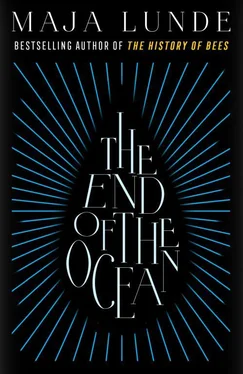Everything could burn. And everything did. My entire world burned.
Some break-ups happen slowly. You can’t put your finger on the moment when it’s over, it’s a gradual, silent transition, while other break-ups… I know the exact day I lost Magnus.
No. The day he lost me.
I remember the minute, the second, when I realized it was over.
The tide is about to turn. Right now, for a short while, the river is still and flat beneath me, beneath Blue , until once more the pull of the tide returns. It’s like driving on freshly paved asphalt, the engine pounding in my ears, allowing me no peace, only the sound of a monotonous droning. If I turned it off I would be at one with nature, able to hear the birds, the light wind I see blowing in the trees onshore, the gurgling of water in motion. But the engine is the only thing I have now.
I have put out tires as fenders along the entire broadside and the mast is lashed securely to the deck. Blue is a sad creature, amputated, bandaged and bound on a brown river.
Water itself is colorless. It’s the world around it that gives it color, reflections from the sky, from the surroundings; water is never just water.
Water absorbs and whirls around everything it meets.
Water is humus, sand, clay, plankton.
Water is given color by the bed it covers.
Water reflects the world.
And now the water is reflecting the blue sky above me and the tree branches reaching across the river, while its color also comes from a sludgy bed I can’t see.
*
At Castets-en-Dorthe, the first lock rises in front of me, a vertical wall many meters tall, and the river is banked by a muddy shore.
As I sail closer, I can hear the rushing sound from inside, torrents of water in continuous man-made motion.
A lock-keeper comes out onto the edge, looks down at me.
“Are you going in alone?”
He looks at me skeptically, as if he wants to finish the sentence with “old woman”— are you going in alone, old woman.
I feel the urge to retaliate, tell him about the storm I just weathered, about the fog, about all the voyages on the open sea, the demonstrations, the nights spent in a holding cell. What’s a lock compared to that?
“It’s prohibited,” he continues. “The current gets too strong when the sluices are filled. You won’t have a chance of keeping the boat against the wall on your own, you won’t stand a chance.”
“You have anyone on standby?” I ask.
“Huh?”
“Someone who can come with me, you know someone?”
“No.”
“Me neither.”
“But it’s prohibited,” he says, a little more meekly.
“I’m going in,” I say.
“Idiot,” he mumbles.
I start to answer but suddenly begin to doubt whether he actually said anything; the water is making too much noise and he has already turned half away, given up. He lets me through.
All the water is drained out of the sluice chamber, everything is electric here, but I know that further up the canal the locks are manual; the lock-keepers must open the gates.
The water gushes out into the river with an enormous force. I heave the boat to while I wait, then the gates open and I can sail in.
A metallic creaking sound can be heard as the gate slides into place. The smell of damp stone walls greets me, confined, stagnant; it’s called a chamber and I understand why—right now there’s no way out.
There’s just me and the water and I can manage this by myself. I throw two lines up to the lock-keeper; I can control both lines using the primary winch in the cockpit, but I’ve also set them up with natch blocks in the bow and stern, so I can pull in the slack on the lines as the boat rises.
But he doesn’t give me a nod of appreciation from above and I have time to wonder whether it will work before the water starts streaming in.
Slowly the water rises and Blue along with it. I pull in the mooring lines, pulling and pulling. I must at all times make sure that the boat stays up against the wall of the sluice. But the force of the water gushing in and filling up the sluice pulls at Blue , pulls at me. I curse the long keel that makes Blue especially difficult to handle as the water takes hold, trying to force the boat all the way back into the chamber, to throw us towards the gate I just passed through. The line slips on the winch. I lunge forward and grab hold of it again.
The lock-keeper shakes his head up there, swears and throws up his arms dramatically in a typically French manner. I turn away, can’t be bothered to pay any attention to him, concentrate on the lines, on pulling in the slack.
I don’t make any more mistakes. The sweat pours off me, I concentrate wholly on the lines, on keeping the side of the boat against the sluice’s one chamber wall and Blue is steady now, until the water stops streaming in, until we’ve risen several meters—it must be at least five meters, maybe ten.
The sluice gate in front of me opens, it creaks even more, as if it were in the process of rusting completely to pieces; now there’s yet another chamber and I will have to go through the whole process one more time.
The engine has been idling and, when I can finally sail out into the canal, I put it into gear. The water is greener here, maybe it’s because of the trees growing close together along the shore, the leaves reflected in the surface, or maybe because of the sea grass growing down there. A single blade has come loose and is floating on the surface and I must be on the alert for this sea grass. It can get into the backwash inlet, clog it, like hair in a drain.
I can’t see the bottom, but nonetheless it feels as if it were pressing towards me. The Arietta extends 1.35 meters below the waterline. The water level should be at least two meters in the canal now, but that also depends on how much the farmers in the area are draining from it. If the vegetables need water, the water level will be low, so I keep an eye on the water at all times, as I creep further and further inland.
An oncoming boat from time to time, otherwise there’s nothing to do, nothing to concentrate on, just this calm movement forward through this placid landscape. I miss the ocean, I miss the waves, the concentration they demand. Here it’s impossible to escape from myself.
*
Magnus, I know exactly when I lost you and you lost me and it took me by such surprise, a shock, even though I should have known beforehand. Yes, I should have seen it coming. Because you didn’t participate actively in the protest like the rest of us; more and more frequently you left us up there on the mountain and drove down to your valley, to the farm, to your parents. Didn’t you feel safe with us, were you frightened or were you just fed up—with the discussions, the songs, the warmth?
One evening when you came back you brought your father with you.
Daddy welcomed you, the way he welcomed everyone who came. In his large, dark-green parka, with a heavy sweater underneath, he looked larger than before; for the first time his name Bjørn, meaning bear, suited him.
He shook Sønstebø’s hand, greeted him, said it had been a long time, but that he didn’t blame him, although we all wondered about the absence of the people from Eidesdalen. We knew they had farms, they had animals but still… it would have strengthened the protest had they been here with us. But Daddy didn’t say anything about this and it was a conscious choice.
“So here you are,” Daddy said.
“Yes,” Sønstebø said.
“Come have a seat, have some coffee,” Daddy said.
“Thank you kindly,” Sønstebø said.
Читать дальше










